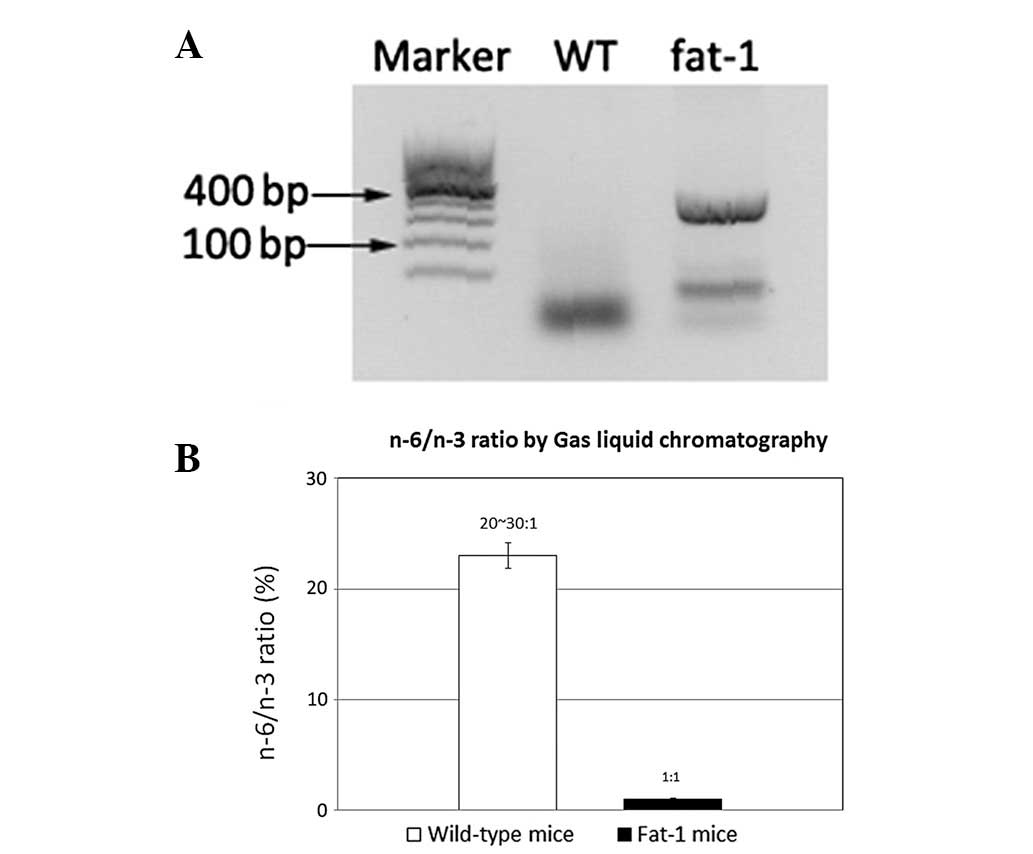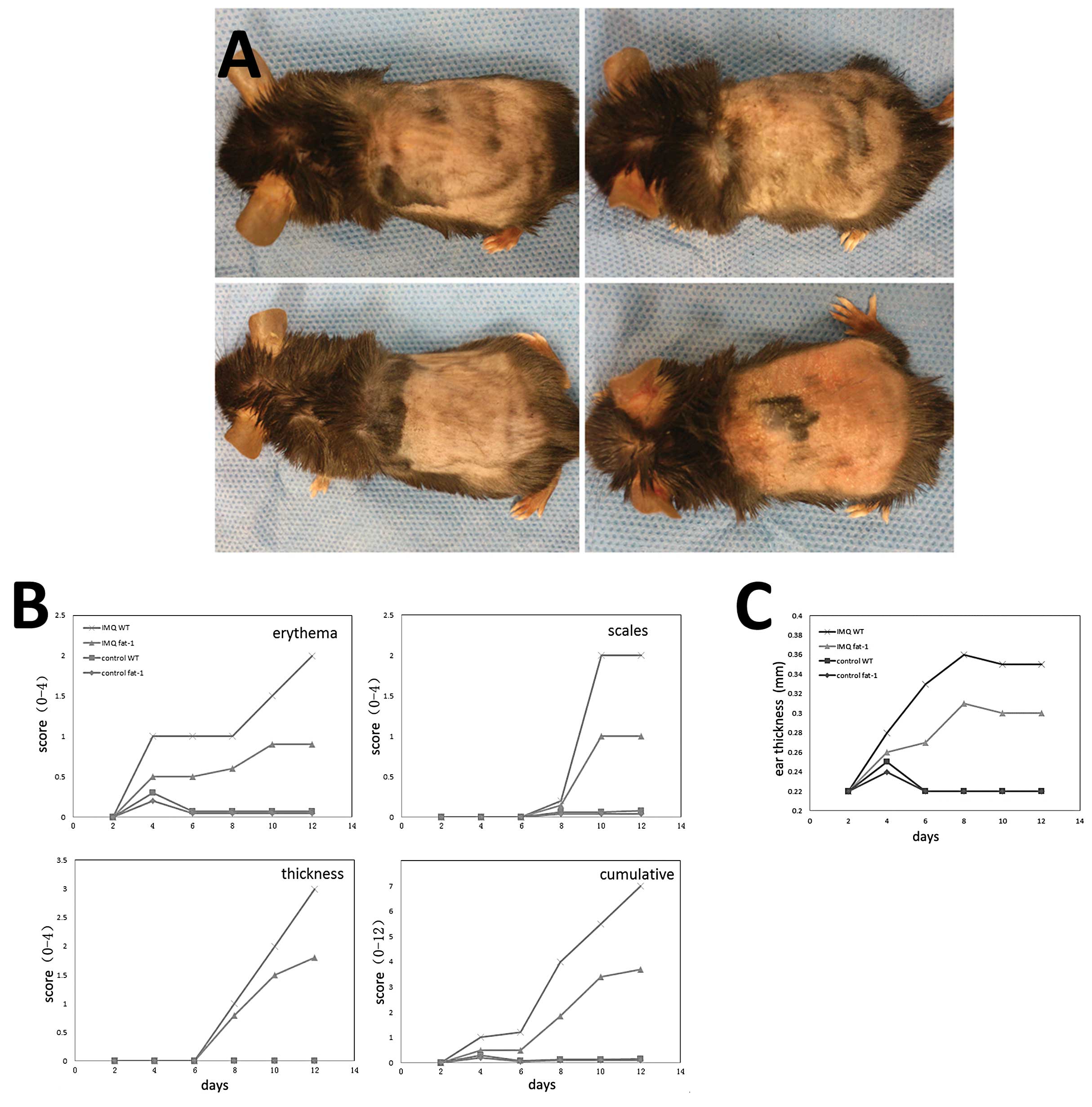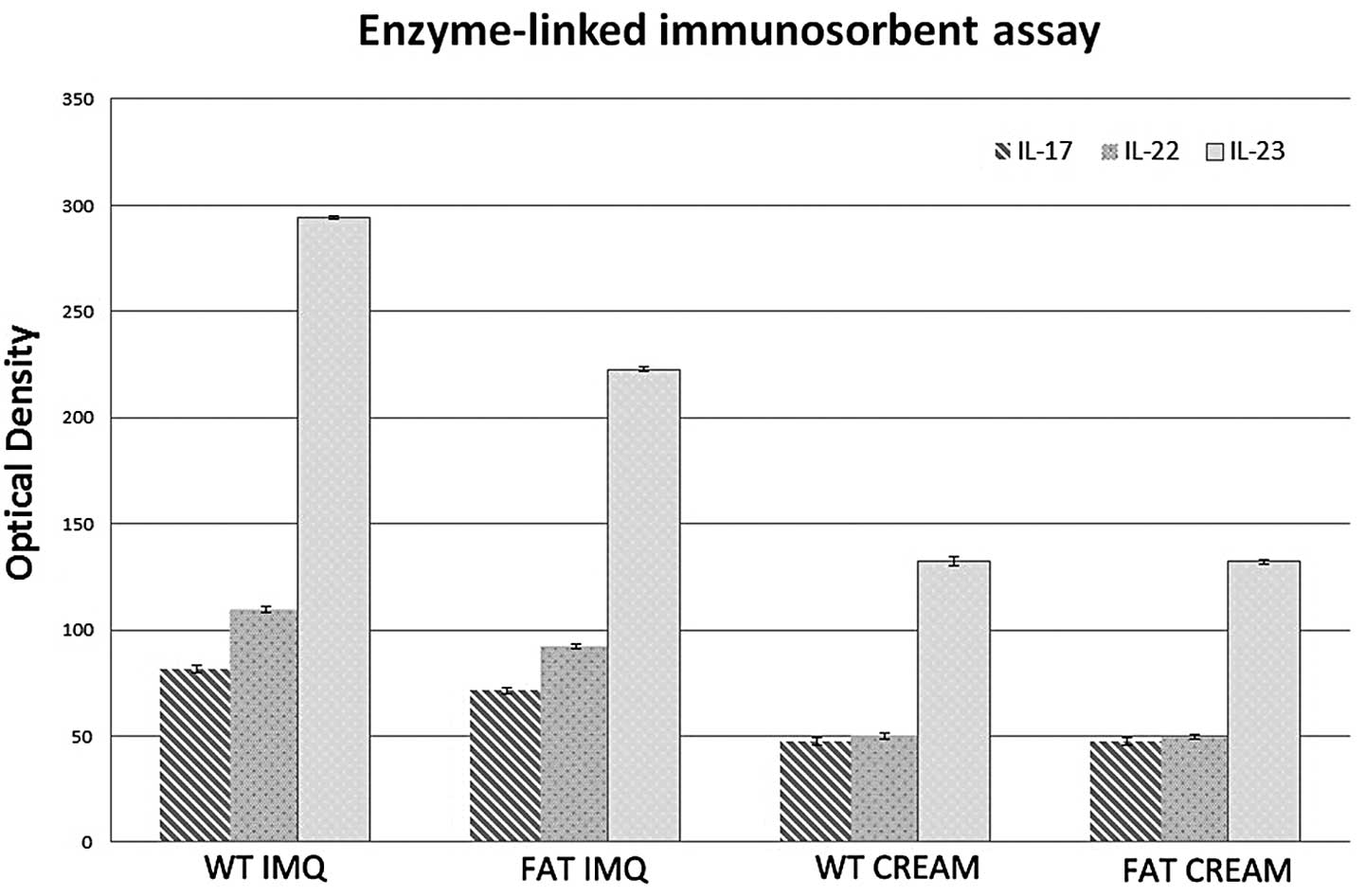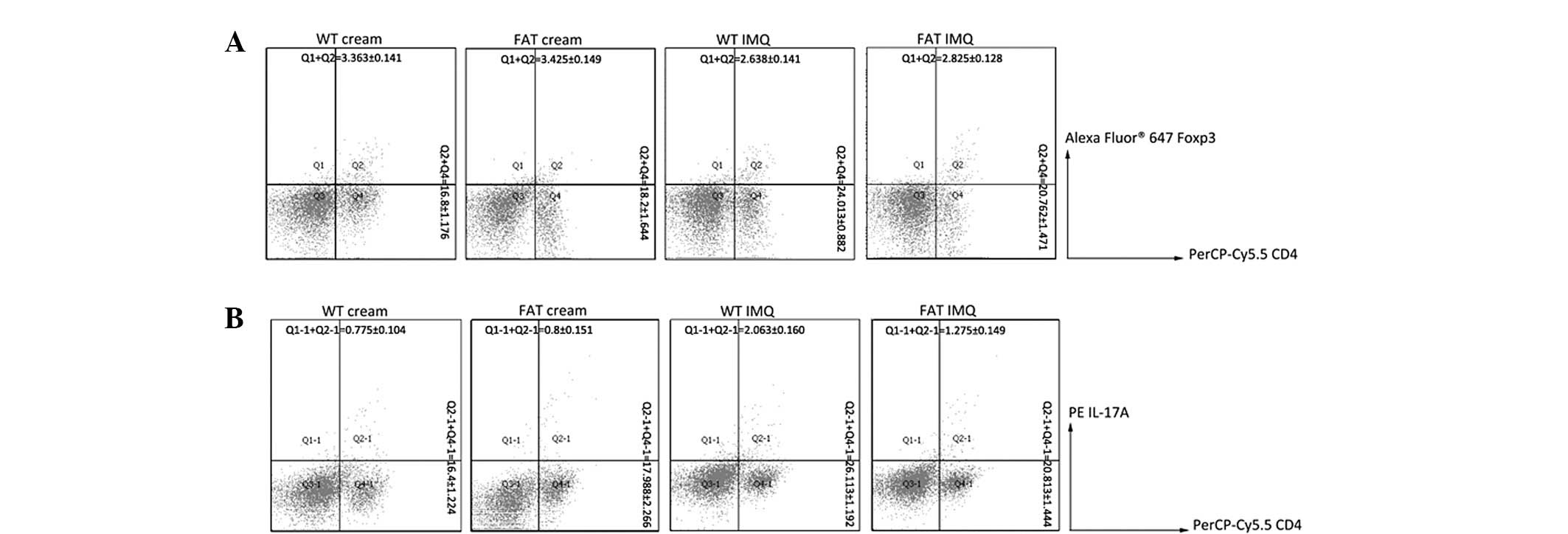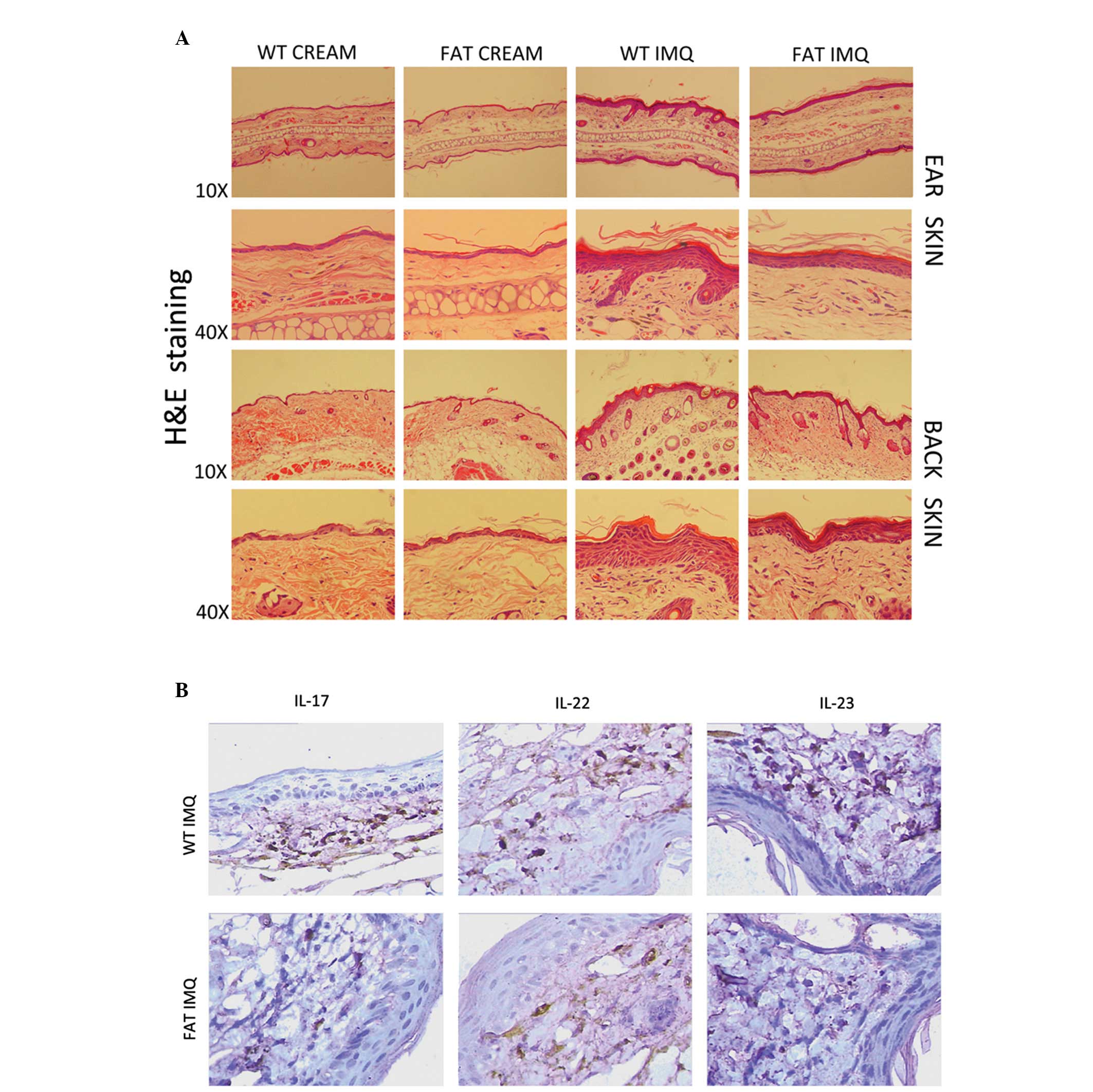|
1
|
Yoo IS, Lee JH, Song ST, Kim JH, Lee HJ
and Kang SW: T-helper 17 cells: the driving force of psoriasis and
psoriatic arthritis. Int J Rheum Dis. 15:531–537. 2012. View Article : Google Scholar : PubMed/NCBI
|
|
2
|
Tokura Y: Th17 cells and skin diseases.
Nihon Rinsho Meneki Gakkai Kaishi. 35:388–392. 2012.(In
Japanese).
|
|
3
|
Mudigonda P, Mudigonda T, Feneran AN,
Alamdari HS, Sandoval L and Feldman SR: Interleukin-23 and
interleukin-17: importance in pathogenesis and therapy of
psoriasis. Dermatol Online J. 18:12012.PubMed/NCBI
|
|
4
|
El Malki K, Karbach SH, Huppert J, et al:
An alternative pathway of imiquimod-induced psoriasis-like skin
inflammation in the absence of interleukin-17 receptor a signaling.
J Invest Dermatol. 133:441–451. 2013.PubMed/NCBI
|
|
5
|
Wang WJ, Yin XY, Zuo XB, et al: Gene-gene
interactions in IL23/Th17 pathway contribute to psoriasis
susceptibility in Chinese Han population. J Eur Acad Dermatol
Venereol. 27:1156–1162. 2013. View Article : Google Scholar : PubMed/NCBI
|
|
6
|
Zhang L, Yang XQ, Cheng J, Hui RS and Gao
TW: Increased Th17 cells are accompanied by FoxP3(+) Treg cell
accumulation and correlated with psoriasis disease severity. Clin
Immunol. 135:108–117. 2010.
|
|
7
|
Res PC, Piskin G, de Boer OJ, et al:
Overrepresentation of IL-17A and IL-22 producing CD8 T cells in
lesional skin suggests their involvement in the pathogenesis of
psoriasis. PLoS One. 5:e141082010. View Article : Google Scholar : PubMed/NCBI
|
|
8
|
Kagami S, Rizzo HL, Lee JJ, Koguchi Y and
Blauvelt A: Circulating Th17, Th22, and Th1 cells are increased in
psoriasis. J Invest Dermatol. 130:1373–1383. 2010. View Article : Google Scholar : PubMed/NCBI
|
|
9
|
Kim EH, Bae JS, Hahm KB and Cha JY:
Endogenously synthesized n-3 polyunsaturated fatty acids in fat-1
mice ameliorate high-fat diet-induced non-alcoholic fatty liver
disease. Biochem Pharmacol. 84:1359–1365. 2012. View Article : Google Scholar : PubMed/NCBI
|
|
10
|
Monk JM, Jia Q, Callaway E, et al: Th17
cell accumulation is decreased during chronic experimental colitis
by (n-3) PUFA in Fat-1 mice. J Nutr. 142:117–124. 2012. View Article : Google Scholar : PubMed/NCBI
|
|
11
|
Bellenger J, Bellenger S, Bataille A, et
al: High pancreatic n-3 fatty acids prevent STZ-induced diabetes in
fat-1 mice: inflammatory pathway inhibition. Diabetes.
60:1090–1099. 2011. View Article : Google Scholar : PubMed/NCBI
|
|
12
|
Mohammed A, Janakiram NB, Brewer M, et al:
Endogenous n-3 polyunsaturated fatty acids delay progression of
pancreatic ductal adenocarcinoma in
Fat-1-p48(Cre/+)-LSL-Kras(G12D/+) mice. Neoplasia. 14:1249–1259.
2012.PubMed/NCBI
|
|
13
|
McCusker MM and Grant-Kels JM: Healing
fats of the skin: the structural and immunologic roles of the
omega-6 and omega-3 fatty acids. Clin Dermatol. 28:440–451. 2010.
View Article : Google Scholar : PubMed/NCBI
|
|
14
|
Kang JX, Wang J, Wu L and Kang ZB:
Transgenic mice: fat-1 mice convert n-6 to n-3 fatty acids. Nature.
427:5042004. View
Article : Google Scholar : PubMed/NCBI
|
|
15
|
Wei D, Li J, Shen M, et al: Cellular
production of n-3 PUFAs and reduction of n-6-to-n-3 ratios in the
pancreatic beta-cells and islets enhance insulin secretion and
confer protection against cytokine-induced cell death. Diabetes.
59:471–478. 2010. View Article : Google Scholar
|
|
16
|
Bhattacharya A, Chandrasekar B, Rahman MM,
Banu J, Kang JX and Fernandes G: Inhibition of inflammatory
response in transgenic fat-1 mice on a calorie-restricted diet.
Biochem Biophys Res Commun. 349:925–930. 2006. View Article : Google Scholar : PubMed/NCBI
|
|
17
|
van der Fits L, Mourits S, Voerman JS, et
al: Imiquimod-induced psoriasis-like skin inflammation in mice is
mediated via the IL-23/IL-17 axis. J Immunol. 182:5836–5845.
2009.PubMed/NCBI
|
|
18
|
Ma DW, Ngo V, Huot PS and Kang JX: N-3
polyunsaturated fatty acids endogenously synthesized in fat-1 mice
are enriched in the mammary gland. Lipids. 41:35–39. 2006.
View Article : Google Scholar : PubMed/NCBI
|
|
19
|
Hudert CA, Weylandt KH, Lu Y, et al:
Transgenic mice rich in endogenous omega-3 fatty acids are
protected from colitis. Proc Natl Acad Sci USA. 103:11276–11281.
2006. View Article : Google Scholar : PubMed/NCBI
|
|
20
|
Roller A, Perino A, Dapavo P, et al:
Blockade of phosphatidylinositol 3-kinase PI3Kδ or PI3Kγ reduces
IL-17 and ameliorates imiquimod-induced psoriasis-like dermatitis.
J Immunol. 189:4612–4620. 2012.
|
|
21
|
Gago-Dominguez M, Yuan JM, Sun CL, Lee HP
and Yu MC: Opposing effects of dietary n-3 and n-6 fatty acids on
mammary carcinogenesis: The Singapore Chinese Health Study. Br J
Cancer. 89:1686–1692. 2003. View Article : Google Scholar : PubMed/NCBI
|
|
22
|
Kang JX: Fat-1 transgenic mice: a new
model for omega-3 research. Prostaglandins Leukot Essent Fatty
Acids. 77:263–267. 2007. View Article : Google Scholar : PubMed/NCBI
|
|
23
|
Blok WL, Katan MB and van der Meer JW:
Modulation of inflammation and cytokine production by dietary (n-3)
fatty acids. J Nutr. 126:1515–1533. 1996.PubMed/NCBI
|
|
24
|
Wang C, Harris WS, Chung M, et al: n-3
Fatty acids from fish or fish-oil supplements, but not
alpha-linolenic acid, benefit cardiovascular disease outcomes in
primary- and secondary-prevention studies: a systematic review. Am
J Clin Nutr. 84:5–17. 2006.PubMed/NCBI
|
|
25
|
Jia Q, Lupton JR, Smith R, et al: Reduced
colitis-associated colon cancer in Fat-1 (n-3 fatty acid
desaturase) transgenic mice. Cancer Res. 68:3985–3991. 2008.
View Article : Google Scholar : PubMed/NCBI
|
|
26
|
Qi K, Fan C, Jiang J, et al: Omega-3 fatty
acid containing diets decrease plasma triglyceride concentrations
in mice by reducing endogenous triglyceride synthesis and enhancing
the blood clearance of triglyceride-rich particles. Clin Nutr.
27:424–430. 2008. View Article : Google Scholar
|
|
27
|
Calder PC: Immunomodulation by omega-3
fatty acids. Prostaglandins Leukot Essent Fatty Acids. 77:327–335.
2007. View Article : Google Scholar : PubMed/NCBI
|















